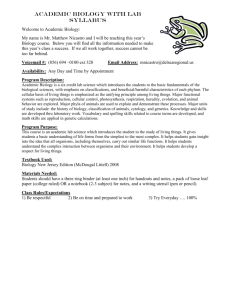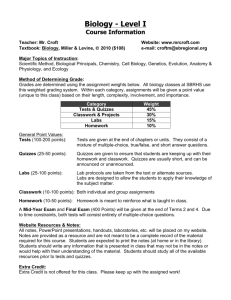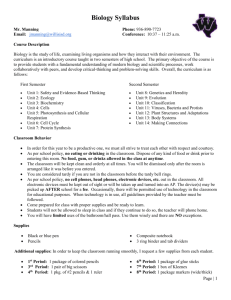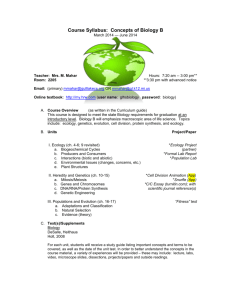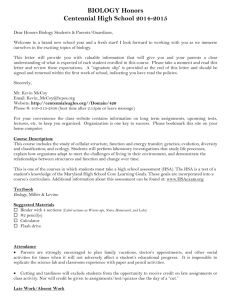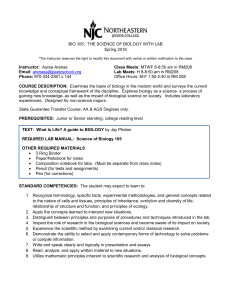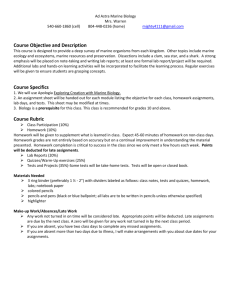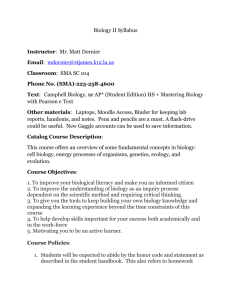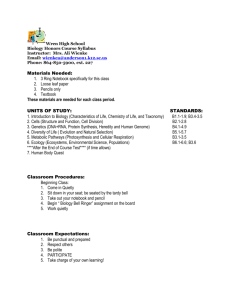AP Biology Course Syllabus
advertisement
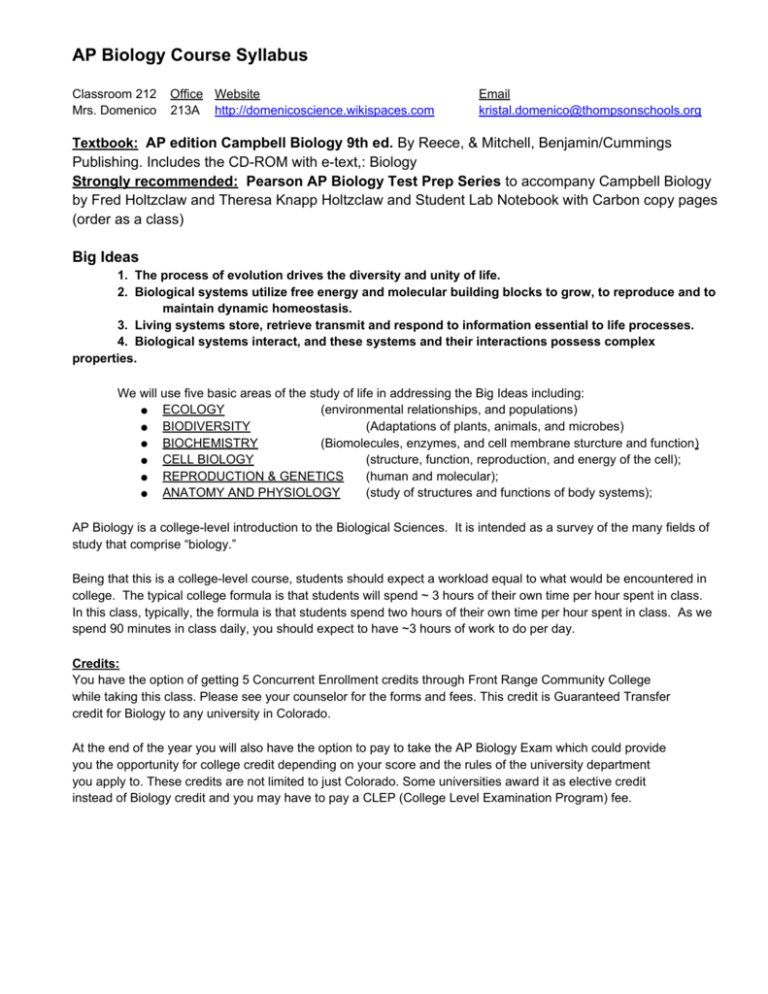
AP Biology Course Syllabus Classroom 212 Mrs. Domenico Office Website 213A http://domenicoscience.wikispaces.com Email kristal.domenico@thompsonschools.org Textbook: AP edition Campbell Biology 9th ed. By Reece, & Mitchell, Benjamin/Cummings Publishing. Includes the CD-ROM with e-text,: Biology Strongly recommended: Pearson AP Biology Test Prep Series to accompany Campbell Biology by Fred Holtzclaw and Theresa Knapp Holtzclaw and Student Lab Notebook with Carbon copy pages (order as a class) Big Ideas 1. The process of evolution drives the diversity and unity of life. 2. Biological systems utilize free energy and molecular building blocks to grow, to reproduce and to maintain dynamic homeostasis. 3. Living systems store, retrieve transmit and respond to information essential to life processes. 4. Biological systems interact, and these systems and their interactions possess complex properties. We will use five basic areas of the study of life in addressing the Big Ideas including: (environmental relationships, and populations) ● ECOLOGY BIODIVERSITY (Adaptations of plants, animals, and microbes) ● (Biomolecules, enzymes, and cell membrane sturcture and function) ● BIOCHEMISTRY (structure, function, reproduction, and energy of the cell); ● CELL BIOLOGY REPRODUCTION & GENETICS (human and molecular); ● (study of structures and functions of body systems); ● ANATOMY AND PHYSIOLOGY AP Biology is a college-level introduction to the Biological Sciences. It is intended as a survey of the many fields of study that comprise “biology.” Being that this is a college-level course, students should expect a workload equal to what would be encountered in college. The typical college formula is that students will spend ~ 3 hours of their own time per hour spent in class. In this class, typically, the formula is that students spend two hours of their own time per hour spent in class. As we spend 90 minutes in class daily, you should expect to have ~3 hours of work to do per day. Credits: You have the option of getting 5 Concurrent Enrollment credits through Front Range Community College while taking this class. Please see your counselor for the forms and fees. This credit is Guaranteed Transfer credit for Biology to any university in Colorado. At the end of the year you will also have the option to pay to take the AP Biology Exam which could provide you the opportunity for college credit depending on your score and the rules of the university department you apply to. These credits are not limited to just Colorado. Some universities award it as elective credit instead of Biology credit and you may have to pay a CLEP (College Level Examination Program) fee. Required Stuff (have every day): In class: ● ● ● ● ● Notebook (for notes). The requisite writing implement (pen or pencil, I don’t really care). A pack of colored pencils. Two colors of highlighters A lab notebook (for collecting data). At home: ● ● ● ● ● Textbook Your Notebook (the one you bring to class) Access to a computer with modern internet browsing capabilities (see me if this is a problem for you). Your flash drive (the one you bring to class) Your Lab Notebook (the one that usually lives in class. Sometimes, as labs require) Workbooks & AP Exam Review Book: You are required to purchase an AP Exam Review book. These purchases will be done through the school (we can get much better prices on these items). The cost of the AP Exam Review Book is undetermined, but will not be more than $20. Rules: My rules are congruent with those laid out in the beginning of your student guidebook. Fundamentally, those rules boil down to four: Respect everyone and everything in this school. You are here to learn. Effort is required. You are expected to do your own work. You may not interfere with anyone else’s right to follow Rules 1, 2 and 3. Specific school policies about cell phones, mp3 players, hats, etc. are enforced in this class. 1 2 3 4 Work- scope and sequence: There are many kinds of assignments in this class: Coursework- (aka “Classwork & Homework”): There are 2 types of coursework ● ● Mandatory: These are things that we do that are always collected and graded. Elective: These are things that you should do, but that will not count against you if you don’t do it. Chiefly this involves documenting your pre-discussion content interfacing. The following forms of documentation are acceptable to earn credit for interfacing with content prior to an in-class discussion: ○ ○ Answers to all Pre-Discussion Questions. Questions should be answered fully, and in complete sentences. Detailed notes of the content covered in the resources for a particular bit of content; the presentation, video lectures, or the relevant sections of the textbook. Notes should demonstrate an organizational structure. In all cases, if the documentation that is submitted is deemed insufficient, you will receive notice. This needs to be rectified by the next submission, or you will not receive credit for all subsequent insufficient documentation. ○ Mandatory assignments are always graded and count for your average. Any elective assignments done to satisfaction are also factored in to your coursework average. In this way, elective coursework that you choose to do helps to provide a buffer in your average to better absorb poor grades on mandatory assignments. Assessment: There are 2 types of assessments in this course: ● ● Minor Assessments (“Quizzes”): You will have a brief quiz at the conclusion of every week (approximately 40 quizzes during the course of the year), and may have more, depending on the trajectory of the class. The trajectory of the class will also determine if quizzes will be counted as mandatory or elective assignments (as described above). Tests: Tests are given two times per quarter. All assessments consist of model AP exam questions (multiple choice, mathematical computation “grid-in’s”, and short answer questions of varying length. Projects: There are a large number of projects that you will engage in during the course of the year. They range in size, scale, and point totals. Expect to be working on at least one project every day (many span weeks of course time). Depending on the particulars of a given project, it will either be counted in your coursework average, or in your assessment average. Labs: You are required to complete every lab that we conduct. We will do approximately 9 labs during the course of the year. These lab activities will be major, long-term, experiences that will involve the development of a particular protocol to answer a question of your own creation, the collection of data, and the generation and publishing of a documentation of your lab experience (typically a lab report, or a presentation). Labs can be anywhere from a week to three months in length, with lab reports typically being due two-three weeks after the conclusion of the experimental portion of the activity. Labs are mandatory coursework that count approximately 10X as much as a typical homework assignment. Midterm: Your Midterm is worth one-eleventh of your final grade. It is a simulated AP exam. Final Project: Following the conclusion of the AP exam in May, we will discuss the guidelines for your final project. It will count as your final exam grade in this class. Late Work Policy: Work is considered “late” when it is submitted after the established collection time. Late homework and classwork can earn a maximum of half credit. Projects and labs lose 10% of total credit for every day that they are late. Makeup work: It is strongly recommended that you attend class every day in a timely fashion. Excessive lateness or absences will make it very difficult for you to keep up with the workload of this course. If you are legally absent, it is your responsibility to makeup all assignments. “I was absent” is not an excuse for missing an assignment (unless I excuse you). All assignments are posted on the class calendar, which is accessible from all course websites. Please discuss missed work with me as soon as you return to class. Work done during absences is due one day after your return to class. You must also make arrangements to makeup any labs, quizzes or tests as soon as you return to school. All excused late work must be completed by the close of the current quarter. If your absence is unexcused, you will receive a “0” on anything we do in class on the day(s) of your absence. This includes classwork, labs, quizzes and tests. You cannot make up any work that is missed due to illegal absences. Grade Calculations: You and your parents will be able to access your course grade on-line beginning the third week of class. Your grade is calculated as follows: Assessments (and Assessment-counted projects) Coursework (and Coursework-counted projects) 50% There is no extra credit offered in this class...ever. 50% Academic Honesty: You are encouraged to work together to study course content. I do not expect fully original answers for pre-discussion questions or similar content interfacing documentation. You are allowed to collaborate on lab exercises. Data among lab partners is expected to be identical. With these two exceptions, all work done in this class is expected to be original or attributed to its original source in either the APA or IEEE format. Any violation of this will result in an automatic 0 on the assignment in question. Cheating on exams, or plagiarism on any other item, will result in an automatic 0, mandatory change of seating, academic referral and notification of parents, notification of guidance counselor, notification of grade-level administrator and the inability to ever receive a college recommendation from me for all parties involved. The AP Exam: The AP exam is given in mid-May. It administered by the College Board and is given in a secure room somewhere in the district. There is a fee for taking the exam. All students who are in this course are required to sit for the AP exam. The grade received on the AP exam does not affect a student’s grade for the course in any way. On-line Behavior: All interaction in the on-line environment must be conducted within the guidelines of the district’s Acceptable Use Policy, which you have signed prior to this year. General Course Flow: We meet every day for the first semester, every other day second semester . The time is structured as follows: ● Content Discussion- Content discussion is unavoidable. To make this as non-boring as possible, you are expected to interface with the content prior to coming to class. It is expected that you have done this, and the style of the discussion is based on this assumption. To wit, I don’t just talk at you. I ask you questions about the content that you interfaced with before you came to class, and you answer them. Everyone gets a turn to demonstrate that they know what they are talking about. Very few things will make you feel worse in this class than not knowing what you are talking about because you did not hold up your end of this deal. It will seem like I am displeased with you, because I will be. You will not feel awesome about this, and neither will I. Most likely you will need to stay after class to have a discussion about it. ● Other Things- Content discussion takes up no more than one half of our time together on any day that we are together. Following content discussion, we move in to a variety of other tasks depending on the day. Maybe its an activity. Maybe it’s a lab. Maybe it’s a quiz. Whatever it is, the expectation is that you will do your very best, focused, effort on whatever it is that we are doing. This is how the days work in this course. Obviously, there are certain aspects of how this course works that emerge from this underlying structure. Here are the major ones: ● ● You don’t come late to this class without an excellent and legitimate excuse. While I am not usually one to put a “Do Now” on the board in an AP-level science course, I am one to begin immediately upon the ringing of the bell. Which means that you need to be ready to go at the ringing of the bell. Provided below, find a daily “Do Now”: ○ Get to class before the bell rings. ○ Make sure your phone is off/silent and well away (unless you are given explicit instruction to use your phone for some course purpose). ○ Take out everything you need before we begin. Typically, I expect that since we have been over this at this particular moment in time and space, that I do not need to repeat myself to a group of students who are taking a college-level course. If I do need to repeat myself more than once, we’ll find ourselves in another one of the aforementioned “bold type” situations. Emergencies notwithstanding, I am disinclined to ever make any exceptions to my expectations. Stated here so that you will not be surprised should you ever ask. ● MAKEUP WORK: 1 Excused absence make-up work and lecture notes will be available from your study buddy or check the wikispace. (You may also check the front counter for handouts.) 2 TESTS AND LABS must be made up by appointment. This is outside of class time. Your lab partner will need to help you with the lab. SCHEDULE YOUR APPOINTMENT THE DAY YOU RETURN TO CLASS or BEFORE a planned absence. Remember, you have only two days to complete your makeup work. EXCEPTION: Work or tests assigned prior to your absence or if it is posted on the wikispace then you are responsible for making up the work the day of return to class.!! FIELD TRIP PARTICIPATION: You must have a grade of C or better and be participating positively in class to attend a Science department field trip! HELP!!!!!!! ● Before School and after school, during lunch periods and study halls by previous appointment (1 day prior). ● Through Electronic Mail (I check my e-mail every day). I am here to help you learn! If you do not understand classwork I will be glad to give you extra help outside of the class. I will let you know my planning periods so you can schedule appointments.
